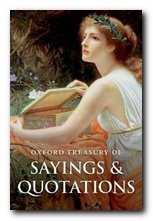origins of quotes, proverbs, and expressions
This Treasury of Sayings and Quotations is a compilation of phrases, bon mots, and observations from sources all over the world. Some are well known, and others are novelties drawn out of the data-bank of human wisdom from all over the world which you are invited to enjoy or send into further circulation. Oxford University Press do a lot of these quotation dictionaries: their Humorous Quotations, Catchphrases, Idioms, Literary Quotations, and Modern Quotations are all very popular.
 The distinctive feature in this compilation is that it has multiculturalism writ large in its selection of materials. They range from the folk-like African proverb When the spiders unite, they can tie up a lion, to the more obviously urban Russian maxim, We pretend to work, they pretend to pay us. The categories are arranged alphabetically – from Ability and Africa, through Marriage and Memory, to Women, Words, Writing and Youth. Then the entries under each topic are arranged chronologically – so, under Writing we go from II Maccabees in the Bible, to Derek Walcott in the Guardian of 1997.
The distinctive feature in this compilation is that it has multiculturalism writ large in its selection of materials. They range from the folk-like African proverb When the spiders unite, they can tie up a lion, to the more obviously urban Russian maxim, We pretend to work, they pretend to pay us. The categories are arranged alphabetically – from Ability and Africa, through Marriage and Memory, to Women, Words, Writing and Youth. Then the entries under each topic are arranged chronologically – so, under Writing we go from II Maccabees in the Bible, to Derek Walcott in the Guardian of 1997.
I come from a backward place: your duty is supplied by the life around you. One guy plants bananas; another plants cocoa; I’m a writer, I plant lines. There’s the same clarity of occupation, and the same sense of devotion.
Derek Walcott 1930
Shakespeare of course crops up in more categories than you can shake a stick at [which is not listed]: The course of true love never did run smooth (Midsummer Night’s Dream) and Is it not strange that desire should so many years outlive performance? (Henry IV, Part 2).
It’s been brought up to date with entries such as shock and awe, dodgy dossier, and the mother of battles which cast a chilling light on the people who used them in the last few years.
It includes well-chosen words from Biblical times to the present day, proverbs from around the world, and well-known phrases and quotations, giving their sources and revealing the contexts from which they emerged. There are even explanations of terms as unlikely as this from the world of recreational drug use:
chase the dragon
take heroin by heating it on a piece of kitchen tin foil and inhaling the fumes. The term is said to be translated from Chinese, and to arise from the fact that the fumes and the molten heroin powder move up and down the piece of tin foil with an undulating movement resembling the tail of the dragon in Chinese myths.
More than a thousand new items have been added to the latest (fourth) edition. I am never quite sure what use people make of these compilations, but once you open them, they are very difficult to close. It’s the easy browsing I suppose – plus the fact that every entry is a gem of condensed human experience.
© Roy Johnson 2011
Oxford Treasury of Sayings and Quotations, Oxford: Oxford University Press (4th edn) 2011, pp.720, ISBN: 0199609128
More on language
More on literary studies
More on writing skills
More on creative writing
More on grammar